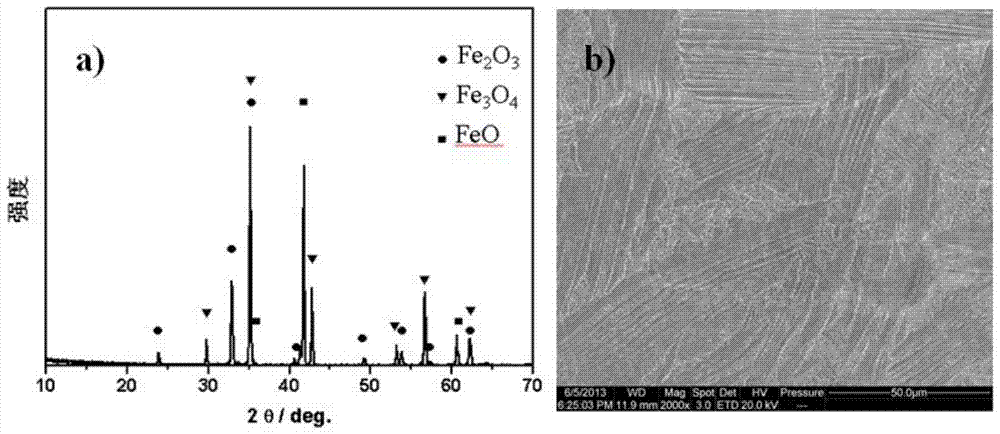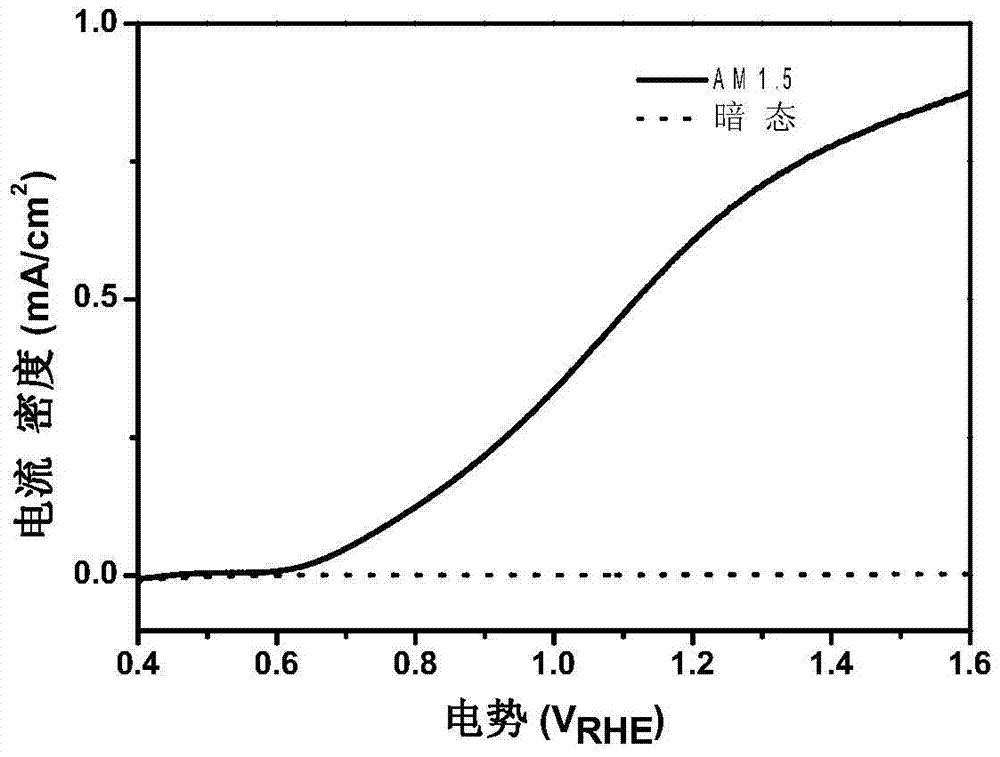a-fe 2 o 3 Photoanode and preparation method thereof
A photoanode, -fe2o3 technology, applied in solar cells, electrical components, electrochemical generators, etc., can solve the problems of over-positive turn-on potential, complex and expensive, and time-consuming preparation methods, and achieve tight integration and low cost Effect
- Summary
- Abstract
- Description
- Claims
- Application Information
AI Technical Summary
Problems solved by technology
Method used
Image
Examples
Embodiment 1
[0019] Metal Fe sheets (mass purity 99.995%) (5mm×10mm×0.5mm1 piece) were ultrasonically cleaned in acetone for 20 minutes, rinsed with deionized water after removal, and dried with a nitrogen gun. Adjust the ratio of hydrogen and oxygen, and control the hydrogen flame at 1400°C. Clamp one end of the iron sheet with tweezers and place it in a hydrogen flame for 1 second. Quickly take it out and cool it at room temperature to get a metal Fe sheet with FeO layer, Fe 3 o 4 layer, α-Fe 2 o 3 The photoanode on the surface layer is blue in main body and slightly yellow in surface.
[0020] Combined with RAMAN spectroscopy and SEM analysis, it is proved that the metal Fe flakes have FeO layer, Fe 3 o 4 layer, α-Fe 2 o 3 surface layer.
Embodiment 2
[0022] Metal Fe sheets (mass purity 99.99%) (5mm×10mm×0.5mm1 piece) were ultrasonically cleaned in acetone for 20 minutes, rinsed with deionized water after removal, and dried with a nitrogen gun. Adjust the ratio of hydrogen and oxygen, and control the hydrogen flame at 1400°C. Clamp one end of the iron sheet with tweezers and place it in the flame for 1 second. Quickly take it out and cool it at room temperature to get a metal Fe sheet with FeO layer, Fe 3 o 4 layer, α-Fe 2 o 3 The photoanode on the surface layer is blue in main body and slightly yellow in surface.
Embodiment 3
[0024] Metal Fe sheets (mass purity 99.5%) (5mm×10mm×0.5mm1 piece) were ultrasonically cleaned in acetone for 20 minutes, rinsed with deionized water after removal, and dried with a nitrogen gun. Adjust the ratio of hydrogen and oxygen, and control the hydrogen flame at 1400°C. Clamp one end of the iron sheet with tweezers and place it in the flame for 1 second. Quickly take it out and cool it at room temperature to get a metal Fe sheet with FeO layer, Fe 3 o 4 layer, α-Fe 2 o 3 The photoanode on the surface layer is blue in main body and slightly yellow in surface.
PUM
 Login to View More
Login to View More Abstract
Description
Claims
Application Information
 Login to View More
Login to View More - R&D
- Intellectual Property
- Life Sciences
- Materials
- Tech Scout
- Unparalleled Data Quality
- Higher Quality Content
- 60% Fewer Hallucinations
Browse by: Latest US Patents, China's latest patents, Technical Efficacy Thesaurus, Application Domain, Technology Topic, Popular Technical Reports.
© 2025 PatSnap. All rights reserved.Legal|Privacy policy|Modern Slavery Act Transparency Statement|Sitemap|About US| Contact US: help@patsnap.com


